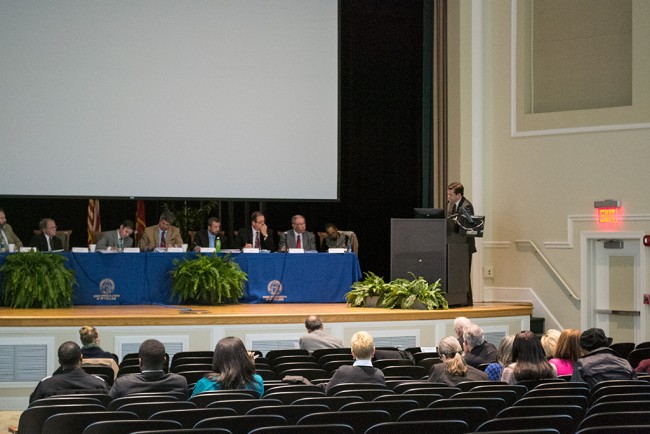by Georgia Center for Opportunity | Feb 7, 2014
Georgia Center for Opportunity (GCO) is pleased to see Governor Nathan Deal and U.S. Attorney Sally Yates (Northern District of Georgia) exercise their influence to encourage business leaders across the state to hire ex-offenders. They are urging employers to give ex-offenders a fair shot in the hiring process and outlining the benefits available to those who choose to hire them.

Governor Deal speaking at a Reentry Summit with U.S. Attorney Sally Yates on Feb. 5, 2014.
Image credit: Georgia.Gov, Office of the Governor.
These actions are consonant with recommendations made by GCO’s Prisoner Reentry Working Group this past December based on input from criminal justice practitioners in Georgia and a review of best practices across the country (See Increasing Employment Opportunities for Ex-Offenders).
One important recommendation made by the working group included increasing the chance that a person with a criminal record will get hired by postponing the question about an applicant’s criminal history to a point after the interview stage of the hiring process. Such an action would give the applicant an opportunity to demonstrate his or her qualifications for a job and provide an explanation for any criminal history to the employer during the interview. It also prevents an employer from automatically screening a candidate who may be the best fit for the position.
Another key recommendation made by the working group is that the state should set the example for other employers by hiring ex-offenders. This action would demonstrate that the state is serious about helping ex-offenders become employed and successfully transition back into society. We believe that the degree of success the state has in finding and maintaining qualified ex-offenders as employees will directly impact the willingness of private employers to adopt similar policies.
Read the following articles posted on February 6, 2014 in the Savannah Morning News to learn more about steps that the key state leaders are making to encourage businesses to hire ex-offenders: https://savannahnow.com/news/2014-02-06/ga-officials-urge-businesses-hire-ex-prisoners#.UvTmvLT-L1V.
by Georgia Center for Opportunity | Jan 27, 2014
Below is a guest blog by Dr. Eric Wearne of Georgia Gwinnett College and formerly with the Governor’s Office of Student Achievement. Dr. Wearne currently leads GCO’s College & Career Pathways working group.
*********************************
GCO’s college and career readiness working group met at Georgia Gwinnett College in Lawrenceville last week to continue the “college” aspect of its work. The group specifically focused on high remediation rates, communication between high schools and colleges regarding expectations, and issues often faced by first-generation college students. Here is a closer look at some take-aways from this meeting:
- High remediation rates. University System of Georgia (USG) institutions offer three remedial, or “learning support” courses, in reading, English, and math. Whether needing remediation in one area or more than one, Georgia students have historically enrolled in these courses at what seem like high rate. In Fall 2008 (the most recent data reported by USG), USG institutions enrolled 46,500 first-time freshmen. Of those 46,500, 11,603, or 25 percent, were required to take at least one learning support course based on USG requirements. Perhaps the numbers have improved over the past 5 years, but this surely remains a problem.
- High school – college communication. The USG actually has a set of high school curriculum requirements for entering freshmen. But even a student who earns all of the credits on this list could need learning support in multiple areas, based on placement test scores. At a high level, agencies and institutions have been communicating for years about the transition from high school to college, from USG’s high school credit requirements to the career pathways initiative to Complete College Georgia. More communication at a finer-grain level, such as between college faculty and high school teachers in specific content areas, is an area the group spent significant time discussing, and will continue to refine.
- First-generation college students. Finally, the group also explored issues related to first-generation college students. Skills like learning the diligence to wake up, go to campus, attend class, pay attention, and stay the whole time—without anyone telling the student to do so – are skills that many students are not necessarily forced to practice in high school. Many can even graduate without them. Add to this the lack of a family member with experience in building a college schedule, or navigating financial aid, and it becomes much clearer why many first-generation college students struggle on campus. Georgia Gwinnett College provides significantly more individual mentoring for students, as well as much more “intrusive” advising; the college actually attempts to find students who may be struggling, and reach out to them, rather than passively waiting for students who need help to find a campus advising or tutoring center. These efforts have borne results, as GGC has retention rates much higher than comparable institutions; rates that, in fact, sometimes rival the retention rates at Research I institutions.
These areas are part of the framework of the group’s efforts at finding practical solutions to improve the college readiness of Georgia students. Next month, the group will focus on issues specific to “career” readiness, and will work toward preliminary recommendations, and a report on the first stage of its work.
by Eric Cochling | Jan 15, 2014
Below is a guest blog by Dr. Eric Wearne of Georgia Gwinnett College and formerly with the Governor’s Office of Student Achievement. Dr. Wearne currently leads GCO’s College & Career Pathways working group.
****************************
By: Dr. Eric Wearne
What it means to be “college ready” has been a popular topic of conversation among educators in school systems, state agencies, and even at the national level for several years. Local schools certainly think about this, though they are not directly held accountable for their graduates’ outcomes (other than graduation itself). The Georgia Department of Education and the University System of Georgia have worked on college readiness definition and alignment issues for several years. SAT and ACT publish their opinions of what constitutes “college readiness” (based on their respective tests) every year. And the federal report that was meant as a “blueprint” for reform of no child left behind very clearly discusses USED’s desire to increase “college readiness.”
Over the past few months, GCO’s working group on college and career readiness has met and started defining its research agenda in the area of improving college readiness outcomes.
In its first few meetings, the group has looked specifically at college readiness. The group has chosen to focus its efforts in this area by looking at the particular issues of three sets of students:
a. Students in college but not prepared for it;
b. Students currently in high school and in danger of dropping out;
c. Students in high school (not in danger of dropping out), but not on track for college or careers.
Today, the group will meet at Georgia Gwinnett College, and will hear presentations about issues related to students in need of remediation and first-generation college students. SAT, ACT, and USED have suggested college readiness standards or goals, as noted above. More practically for Georgia schools, the University System of Georgia has defined what it means to be “college ready” through its Required High School Curriculum. The requirements are reasonable, and both public and private schools in Georgia know what these requirements are and help their students meet them. But the fact remains that large numbers of students who would like to attend college, and work toward (and often attain) these credentials are still not college ready. How might colleges support students who they have admitted, but who are not really college ready? What can K12 do to ensure that their graduates are able to do what they want to with their lives, or, as GCO often puts it, reach “middle class by middle age?” This ground is where GCO’s working group will conduct its research and find recommendations.
This is just the first stage in the group’s work. In the coming months, the group will look more specifically at career readiness, broadly-defined: career academies, vocational education, apprenticeships, etc. Other areas the group will explore as it works toward policy recommendations are: looking at the impact of teacher effectiveness, teacher training, and teacher career responsibilities on college- and career-readiness outcomes; exploring the possibilities that may come from online learning technologies and related strategies such as competency-based learning; and other areas the group finds necessary and worthwhile.
by Georgia Center for Opportunity | Dec 11, 2013
This week, Georgia Center for Opportunity (GCO) published its first report on ways to improve reentry for ex-offenders in the state. The report focuses on increasing employment opportunities for ex-offenders and offers six recommendations for the State of Georgia to consider implementing. The report is a product of GCO’s Prisoner Reentry Working Group that has been working to develop solutions for curbing recidivism and improving offenders’ transition to communities throughout Georgia.
The first report focuses on employment because of the critical role it plays in an offenders’ success outside of prison.
Read the full report: Increasing Employment Opportunities for Ex-Offenders

-
- Image credit: U.S. Department of Labor, Bureau of Labor Statistics
by Georgia Center for Opportunity | Dec 3, 2013
The Governor’s Special Council on Criminal Justice Reform invited organizations from across the state to present recommendations for improving ex-offender outcomes at the Department of Corrections Headquarters in Forsyth, Georgia, Tuesday, November 26.
Eric Cochling, VP of Policy Advancement for Georgia Center for Opportunity, testified before the council with proposals generated from GCO’s Prisoner Reentry Working Group on ways to improve employment opportunities for Georgia’s ex-offenders.

-
- Georgia Center for Opportunity’s Eric Cochling testifying before the Governor’s Criminal Justice Reform Council.
He outlined the following five recommendations for the state to consider implementing:
- Lift driver’s license suspensions for drug offenders who have not committed a driving-related crime.
- Ensure offender’s identification is secured prior to release so they will be ready to apply for a job upon leaving prison.
- Incentivize employers to hire ex-offenders through offering tax credits or deductions, a bonding program, and protection from liability.
- Increase ex-offenders’ chances of being hired by postponing questions about criminal convictions until after an interview has been conducted, with the state setting the example by implementing this recommendation for public employment first.
- Lift professional licensing restrictions to allow ex-offenders to work in occupations that were previously off-limits to them because of a felony conviction that is unrelated to the professional license being sought.
Testifying before the Governor’s Council proved to be a critical first step in presenting GCO’s working group findings to state leaders, as the council consists of legislative, judicial, and executive appointees, as well as representatives from various sectors of criminal justice at the state and local level.
Established by the Governor in 2011 to protect public safety and hold offenders accountable while controlling state costs, the council has proposed significant reforms for adult sentencing and corrections and juvenile justice. Due to the success of the council’s recommendations and landmark legislation being passed during the 2012 and 2013 legislative sessions, Governor Deal commissioned the council to focus on improving prisoner reentry in the state next year, too.
For the upcoming 2014 legislative session, the council is working diligently to compile the best recommendations for the state to implement to reduce recidivism. However, due to the scope of this assignment, bills outlining the council’s recommendations may be introduced over the next couple of sessions.
Eric’s presentation received a positive response from council members leading them to ask several follow-up questions about other states that have enacted similar reforms. GCO is grateful for the opportunity to present and hopes that the council seriously considers our recommendations.
The recommendations for increasing employment opportunities for ex-offenders represent a sample of the reforms being proposed by GCO’s working group. Future recommendations will likely include ways to reduce debt and increase savings for prisoners, establish reentry courts, and implement specialized transitional centers across the state, among others.
by Georgia Center for Opportunity | Dec 2, 2013
Experts in education gathered to discuss the barriers that hinder Georgians from reaching postsecondary success at the first College and Career Pathways Working Group, held November 13. Among those in attendance were leaders from noted college readiness nonprofits, leaders from the private sector, and postsecondary educators.
Beginning this important dialogue included a look at what “college” and “career” readiness signifies for students in Georgia. Sources such as Achieve, Inc. say that:
“…“[C]ollege ready” means being prepared for any postsecondary education or training experience, including study at two- and four-year institutions leading to a postsecondary credential (i.e. a certificate, license, Associate’s, or Bachelor’s degree).”
Georgians must possess the tools to thrive in a two year or four year college setting, as well as have the ability to learn quickly with on-the-job training. Members of the working group aim to outline a vision of “readiness” that channels efforts in schools to not only help students meet educational benchmarks, but also prepare more students for “real world” challenges. Refining these definitions and giving context to the way students in Georgia are prepared for higher education and employment will be a key next step for the working group.
Discussion at the first meeting also focused on improving the quality of teaching in schools across Georgia. Student and parent interaction with teachers can greatly impact the likelihood a child is adequately prepared for postsecondary education. Public Impact, a research and strategy collective focused on quality k-12 learning, finds that one high quality teacher can produce up to a year and a half of learning progress in just one year. Also considered was the need to recruit more high quality educators while raising the accountability of all stakeholders–parents, teachers, and students alike. Exploring ways to link teacher evaluations with student performance will be an equally important next step.
The College and Career Pathways Working Group will continue to review the challenges students face–including identifying common qualities college-ready students share and examining how schools serve at-risk students. Going forward, experts of the group will meet monthly for the next year, continuing on December 18. For more information on The College and Career Pathways Initiative please visit the GCO website here.


